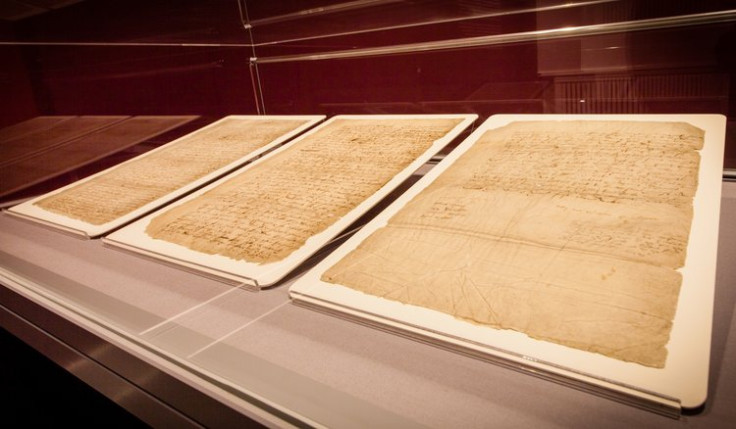Shakespeare's last signed document returns to his birthplace for first time in 400 years
The playwright's will returns to Stratford for first time since it was written in March 1616.
For the first time since it was written in 1616, playwright William Shakespeare's last will and testament will be returned to his home in Stratford upon Avon for the public to see.
The will goes on display for three weeks from tomorrow (16 July–4 August) as part of the Treasures exhibition at the Shakespeare Centre in Stratford-upon-Avon. It has not been there since Dr John Hall, Shakespeare's son-in-law, took the will to London in June 1616 to get a grant of probate.

The document is a crucial text in the study of the life of Britain's greatest playwright as it contains three of the six known signatures from the playwright with the final page signed "By me William Shakespeare". It also gives a direct insight into Shakespeare's earnings, family and belongings.
Dr Delia Garratt, director of cultural engagement at The Shakespeare Birthplace Trust, says, "Displaying this historic document alongside other treasures from our collections will complete the story of Shakespeare's social circle and his relationships with family, friends and business associates."
The last will and testimony of William Shakespeare highlights the wealth that he amassed before his death on 23 April 1616 at the age of 52. Leaving the bulk of his estate to his elder daughter Susanna Hall, he also bequeathed £300 to his younger daughter Judith.
One of the more surprising notations within the text is that he left his "second best bed" to his wife Anne Hathaway. However, this was not uncommon at the time and the best items would often be left to the children over the wife.
Whilst this information can easily be viewed online as well as in prints and photographs of the will, the fact that enthusiasts of the bard can visit the real thing is a matter of significance, especially as it has never been done before in Stratford.

As Paul Taylor, head of collections at Shakespeare's Birthplace Trust told the BBC: "Nothing compares really to being up close to it and thinking really that Shakespeare had this document in his hands, probably checking it through, writing and adding his signatures to it. It's the physicality of it, the fact that you're in the same room with a document 400 years old."
The exhibition has also led to new discoveries about the document that were previously unavailable. In preparing the document for the exhibition, Dr Katy Mair, head of early modern records at the National Archive discovered certain nuances about the text that has been previously undiscovered.
Speaking to the BBC's Today show she described that by using multi-spectral imaging (exposing the text to different bands of light to capture more detail) they found that there were many amendments and alterations made to the will over time, that had long been suspected by scholars but could now be proven by seeing different inks and papers used on the document.
'There are some additions where he has added in some extra details on page 2," Mair told the BBC. "A bequest that he added to his granddaughter and his theatrical fellows and these don't match an earlier set of additions."
The opportunity to visit this historical text and view these new details and discoveries is certainly a dream for Shakespeare enthusiasts but the text will only be on show for three weeks before heading back into storage to protect it for future scholars.
William Shakespeare's Will and Testament will be on display in the Treasures exhibition at Shakespeare's Birthplace, Stratford-upon-Avon from 16 July–4 August.
© Copyright IBTimes 2025. All rights reserved.






















